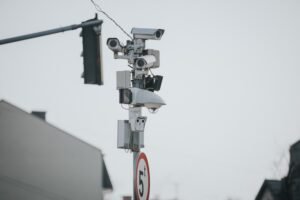Have you ever been in a predicament where you felt an extra pair of eyes would be helpful? Yearning for a reassuring presence that can guarantee the safety of your home while you’re away? In an increasingly unpredictable world, home security has shot up a few notches on every homeowner’s priority list. So, let’s delve into a subject that’s becoming a hot topic in the realm of home design and security. Today, we’re zoning in on the essential features to look for when buying a CCTV Camera System.
CCTV (Closed Circuit Television) Systems have undergone a vast technological transformation, emerging as a go-to method to ensure the security of homes. The sheer availability of diverse CCTV features, technologies, and configurations can be overwhelming though, even for the savvy homeowner.
So, how do you navigate this maze? How do you pick a CCTV camera system that is tailor-made for your requirements? That’s precisely the essence of our today’s blog post. We’re about to embark on a comprehensive journey, exploring the world of CCTV systems, weighing the pros and cons, decoding the jargons, and by the culmination, equipping you with the critical knowledge to make an informed decision.

Deciphering The Why: Understanding the Need for CCTV Systems
The first step towards making an informed purchase involves understanding ‘why’ you need a CCTV system. Is it to deter burglars? Monitor household staff? Or maybe to keep an eye on your furry friend while you’re away? Identifying the exact purpose aids in choosing the correct type of CCTV camera system.
Once the motive is clear, it becomes pivotal to align this with your home’s design. Aesthetic integration of the cameras should not compromise the interior design aesthetics. Also, the installation should be accessible yet subtle enough not to turn your living room into a surveillance room.
Lastly, understanding how technology can cater to your needs crucially shapes the decision-making process. From motion detection features, night vision, face recognition to remote viewing on your smartphone, various technological advancements can significantly increase the efficacy of your CCTV system.
Choosing the Right Type: Analysing the Pros and Cons
Understanding the strengths and weaknesses of different types of CCTV camera systems can tremendously simplify your decision process. For instance, dome-shaped cameras, known for their compact design, provide a wide viewing angle, making them ideal for indoor surveillance. However, they might not possess the sturdiness required for outdoor use.
Similarly, Bullet cameras, known for their long-range viewing capability, are great for monitoring large spaces such as backyards, but their conspicuous design makes them prone to vandalism. Delving into these pros and cons will guide you towards a camera system that aligns with your specific needs.
Factor in the Climate: Weather Resistance and Durability
The climate of your region plays a vital role in the longevity and performance of your CCTV camera system. For instance, cameras with a high IP (Ingress Protection) rating are designed to withstand harsh weather conditions, ensuring clear imaging even during a downpour or dust storm.
The climate of any given region profoundly impacts the longevity and performance of CCTV camera systems. This is particularly evident in areas prone to extreme weather conditions such as heavy rainfall, snowfall, high winds, dust storms, or intense sunlight. In such environments, the durability and resilience of surveillance equipment become paramount factors for effective operation and clear imaging.
One critical aspect in ensuring the resilience of CCTV cameras to adverse weather is the IP (Ingress Protection) rating. IP ratings indicate the level of protection against intrusion from solids like dust and liquids such as water. Cameras with high IP ratings are specifically engineered to withstand harsh weather conditions, thereby ensuring uninterrupted surveillance even in the face of challenging environmental factors.
For instance, cameras with a high IP66 or IP67 rating are designed to be dust-tight and withstand powerful jets of water, making them suitable for use in regions with heavy rainfall or dusty conditions. Similarly, cameras with high IP68 ratings can be submerged in water beyond a meter for prolonged periods, making them ideal for installations in flood-prone areas or locations where they may be exposed to water ingress.
By investing in CCTV cameras with appropriate IP ratings for the prevailing climate conditions, businesses, organizations, and homeowners can significantly enhance the reliability and effectiveness of their surveillance systems, ensuring continuous monitoring and clear imaging even amidst adverse weather scenarios.
Size Matters: Consider Room Space and Camera Size
The camera size you choose should harmonize with the size of your room. A camera too big might be obtrusive, while too small might compromise the image quality. Similarly, it’s also essential to consider the installation process and whether the camera design complements your room’s interiors.
Resolution and Lens: The Heart of Your CCTV System
The lens and resolution mean a world of difference in CCTV cameras. They determine the quality and clarity of your imaging, critical for identifying faces or objects. Understanding the implications of terms like “Megapixels” and “Wide Dynamic Range” can help you select a camera that meets your surveillance needs.
The Bottom Line: Cost Effectiveness
While robust security for your home is essential, understanding the cost-effectiveness and the long-term value of a system is equally important. Consider factors like installation costs, maintenance, system upgrades, and cost of storage while budgeting your CCTV system.
Conclusion: Your Eyes in the Sky
Securing your home goes far beyond installing a padlock or a burglar alarm. It involves forming an intricate safety network, with your CCTV camera system functioning as the eyes in the sky. Understanding the purpose, identifying the correct type, acknowledging the pros and cons, and appreciating the technology will play an instrumental role in shaping your decision.
In the end, the perfect CCTV camera system for you is one that marries your security needs, design aesthetics, technological comfort, and budget, forming the ideal union of security and style. With this comprehensive guide, you’re now ready to embrace an enhanced sense of security, whether you’re at home or away.
